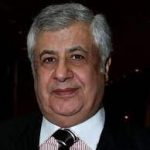...To get all news updates, Join our WhatsApp Group (Click Here)
Also Join our WhatsApp Channel (Click Here)
A Lagos Special Offences Court, Ikeja has issued a bench warrant against the Chairman of Amni Petroleum Limited, who is to testify as a defence witness in a criminal case involving an ex-banker, Chukwuemeka Ekwunife, accused of N168.5m theft.
Ekwunife, who is currently standing trial, was arraigned by the Economic and Financial Crimes Commission, EFCC, for allegedly stealing the sum of N168.5m from several companies belonging to an oil marketer and business woman, Mrs Ngozi Ekeoma.
The EFCC had alleged that Ekwunife, at different times in 2014, stole the said sum of money from, M.R.S oil and Gas, Exit Energy limited, Globin oil and Gas limited, Bond Energy, Greenage Energy Limited – all properties of Nepal Oil and Gas Limited owned by Mrs Ngozi Ekeoma.
But in his defence, the former banker, who resigned from Sterling bank in 2014, said that Mrs Ekeoma pleaded with him to join her business, help her provide credit facilities for her companies and used him to facilitate false documentations in Liberia in order to steal millions of Naira from the Federal government of Nigeria through subsidy scheme.
However, the Chairman of Amni petroleum was issued a bench warrant following his consistent failure to appear before the court after being subpoenaed to testify in defence of the former banker.
The defence counsel, Mr Eubena Amedie, who expressed displeasure over the continued nonappearance of the Amni petroleum chairman, urged the court to issue a bench warrant.
According to the defence Counsel, it is not appropriate for the Counsel to the witness, R. M Onweka, to tell the court that his client cannot come to court due to lack of financial arrangement by the defendant to enable him appear as a witness.
“The subpoena was served on the witness since last year, sometime in December 2020 and a reminder was also sent on September 6, 2021. We also wrote another reminder on September 28. So it’s not right to come to court today and find the witness absent again.
“My Lord, at this time, we would be asking for a bench warrant to be issued against the subpoenaed witness under Section 186 of the Administration of the Criminal Justice Law (ACJL) 2015.
Meanwhile, a defence witness, a Financial consultant, Mr Anthony Abraham, who had earlier testified before the court, said that there exist a relationship between a former banker and the businesswoman, Mrs Ekeoma, in an alleged subsidy fraud that took place in Liberia and Nigeria in 2014.
According to the Financial consultant, he met Ekwunife in Liberia when he (latter) came to open accounts and register some companies.
Mr Abraham, said that he was introduced to Ekwunife by a former client and a friend, who he claimed not to remember his/her identity.
The Financial consultant said that he had known Mrs Ekeoma Ngosi as a friend long before he knew Ekwunife, whom he only met while he was working in Liberia with a bank, First International bank.
The witness, while being led in evidence, said, ” I was working in Liberia with a bank called First International Bank when I met the defendant, Chukwuemeka Ekwunife.
”He came to do business in Liberia with intentions of opening accounts and registering some companies. If I recall, He was introduced to me by a former client and friend of mine, who I can’t really remember”.
When asked if that friend was Mrs Ngozi Ekeoma, the witness said he can’t remember.
However, the defence Counsel showed a document, containing several emails of transactions which he sent to Ekwunife and copied Mr and Mrs Ekeoma, to the witness and asked him to identify it.
The witness identified the emails and said, “Yes I sent these mails to Tochukwu71@yahoo.com (belonging to Ekwunife) and I copied three others namely; Ekeoma_Eme@hotmail.com (belonging to Mr Ekeoma), Ibeyanma72@yahoo.co.uk. (belong to Mrs Ngozi Ekeoma) and U go.na@gmail.com (belonging to Mr Ugochukwu Onwuegbuna).
”The emails were sent as a result of transactions in an account, Dexter Oil Limited, which was opened by Mr Emeka in Liberia and the account was opened with the same name.
“After it was opened, I wasn’t the direct account officer but an officer was assigned. Though I had an overview of the transactions. The account received both inflows and outflows. Mr Emeka was the sole signatory of the account and instructions would normally come from him to run the account.
“I was asked to copy Mr Ugochukwu, who is also a Director in Dexter just as Ekwunife, and then copy both Mr and Mrs Ekeoma in each mail”.
When asked how he knew Mrs Ekeoma, he replied, ” I’ve known her for many years – long before I met Ekwunife. I’ve never had any business transactions with Ngozi before I met Ekwunife. But Mrs Ngozi Ekeoma has a relationship with the defendant, Ekwunife “.
When asked why he copied Mrs Ekeoma if there was no business relationship, the Consultant replied, “I was asked to copy these people and I literarily don’t know all of them.
Meanwhile, according to Ekwunife, in his defence, said that he helped the businesswoman register several companies in Liberia to enable her carry out various importation of petroleum products particularly Premium Motor Spirit (PMS), under the petroleum scheme fund (subsidy scheme) with the FG.
The defendant insisted that the Mrs Ekeoma transfered Premium motor spirit (PMS) meant for consumption in Nigeria to vessels for subsequent sale overseas.
Ekwunife told the court that “I helped her setup various companies like Structured Energy Resources Limited, Dexter Oil Limited, Ritrak Supply and Trading Limited, Gulf Trading and Shipping Limited – all registered in Liberia.
“These companies were used at various times to carry out trading and documentations related to subsidy by the Federal Republic of Nigeria.
“We produced supporting documents like Bill of Laden, the recertification of products, the certificate of quality and certificate of Origin.
“These documentation were done outside the shores of Nigeria and used for trades that never happened in Nigeria. The documentation were done in Liberia for trades that were not live (feasible).
“We (referring to himself and Mrs Ngozi Ekeoma) used these documentations to carry out fraudulent activities by using documents formulated outside the country to perform trade in Nigeria that were not suppose to happen”.
The defendant had also in October 22, 2018, through his solicitors, George Ikoli and Okagbue, petitioned the EFCC revealing an alleged $10m subsidy fraud committed by Mrs Ngozi Ekeoma sometime in 2011 and 2012.
Included in the petition titled: Complaint of $10m subsidy fraud perpetrated by Ngozi Ekeoma and Nepal Oil and Gas,’ acknowledged and received by the EFCC on November 6, 2019, were attached documents evidencing the fraudulent operational activities carried out by Mrs Ngozi Ekeoma and her company.
You can get every of our news as soon as they drop on WhatsApp ...To get all news updates, Join our WhatsApp Group (Click Here)
Also Join our WhatsApp Channel (Click Here)

















